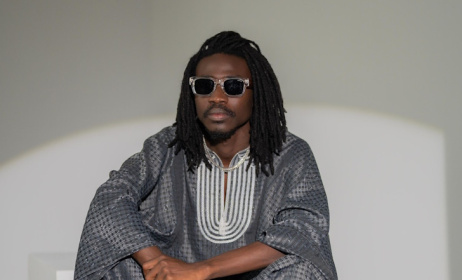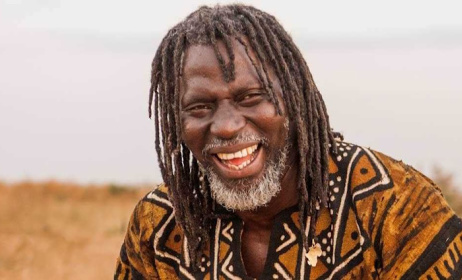Top 5: Political references in Nigerian rap
With the campaign for the 2019 elections officially open in Nigeria, a number of prominent personalities have said they would be running for political office.
 In several songs, Nigerian rappers, including Reminisce, have referenced local politics.
In several songs, Nigerian rappers, including Reminisce, have referenced local politics.
The current president and a former vice president have both announced that they will be running for the country's highest office in what is shaping up to be the country's most keenly contested presidential elections since Nigeria became a democratic state in 1999.
Music In Africa contributor Osareme Edeoghon scours Nigerian rap music for political references. The lines reference newer political issues as well as old ones. Let us know if you disagree with the order of the list or the list itself.
5. Vector: King Kong
Following a feud with Reminisce, Vector released 'King Kong'—a song with as many remixes as Olamide’s 'Who You Epp' and Reminice’s 'Ponmile' has got samples. In one of them, Vector declares,
I’m the hottest in the game
I’m the fire shey?
I run Ekiti (a kitty)—a girl
Fayose
A bit corny and maybe cheesy, but it must be borne in mind that Fayose, the controversial former governor of Ekiti state was at some point the most debated political figure in Nigeria.
4. MI: Another Thing! Do Not Be A Groupie
In 'And Another Thing Don't Be A Groupie' off his 2018 album, A Study of Self Worth: Yxng Dxnzl, MI Abaga berates fellow rappers who have sold their soul for fame or lost focus in pursuant of popularity and money. He asks:
But why am I expecting more
When half of APC were PDP before?
The line is brilliant, not only in how it conveys the disappointment of a section of the populace with the current political climate but it is also wittily expressed. The song talks about loyalty and challenges rappers to stay true, a message that can be extended to Nigeria's political class. One example: The current People's Democratic Party (PDP) flagbearer used to be in All People's Congress (APC) and before then PDP and before then AC (Action Congress) and before then PDP.
3. Reminisce: Fela
I dey control election, Jega
This may not be Reminisce’s most outstanding political reference but it is fitting in view of the forthcoming elections.
This line comes from the chorus of Fela on Baba Hafusa. It acknowledges Attahiru Jega who oversaw perhaps Nigeria’s most accountable election since 1993. But its brilliance lies in the use of the word ‘control’ which is apt for Jega’s much-celebrated calmness, a quality best seen in his reaction to Godsday Orubebe eruption during the last elections.
Anything besides Jega’s pacific control at that crucial moment might have upended the elections. The moment has been immortalised on YouTube. Reminisce provides a sonic memento.
2. Jesse Jagz: Jargo
In 2009, when Musa Yar’Adua left Nigeria for treatment in Saudi Arabia, no one thought he wouldn’t come back fully healthy just as no one envisaged that his ordeal would be well alluded to by a rapper. On 'Jargo', Jesse Jagz did just that:
My flow sicker than the president
I insist I’m the one needing that dialysis
The line refers to a person’s suffering without ridicule. It is different from Olamide’s "Omo to dope die bi ti Whitney", which might be brilliant but also insensitive.
Perhaps Nigerian rappers have become lazy or just not interested in using the many political happenings. With the current political climate in Nigeria and the current president’s many health-related trips abroad, Jesse’s Jagz line should have had a successor.
1. Olamide: Hustle Loyalty Respect
Won ni oye ka ni beef
Beef is part of hiphop
Bi wonse ko eyin Yoruba si ra won laye Awolowo
Ibile United; igi kan ko le dagbo se
To get a handle of what Olamide is up to here, you need some knowledge of Nigerian politics in the 1960s, especially as concerning the Western Region.
In the sixties, Obafemi Awolowo and SL Akintola were at loggerheads as to the direction of the region. While Akintola felt that the west was better allied with the north, Awolowo distrusted the northern oligarchs and opted for an alliance with the east—that and a few other episodes threw the region into bloodshed and a decade-long feud. The top two political figures of the era refused to let go of personal ambitions for the region’s safety and progress. Some have suggested that the military coup that followed and the resulting civil war can be traced to this disagreement.
The beauty of what Olamide did with this reference was that he borrowed from this history and applied it to his relationship with Reminisce. They are the Awo and Akintola of the modern rap game and rather than allow the feud of the sixties repeat itself, they decided to shelve their differences. That this decision has profited both men is evident in their dominance.
























Commentaires
s'identifier or register to post comments